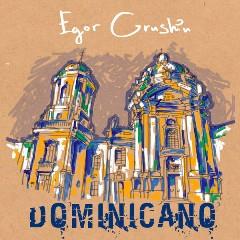Egor Grushin - Dominicano (2014)
Egor Grushin - Dominicano (2014)

1 Beginning 2:59 2 Dominicano 4:01 3 Vento Domani 5:17 4 Kaisermarsch 3:24 5 Together 1:50 6 Descent 3:08 7 Calm 4:50 8 Dawn Viola 4:18 9 Impartial 4:08 10 Unnamed Melody 5:33 11 In Time 1:54 12 Transizione 3:23 Bandura – Yaroslav Dzhus Cello – Roksolana Pakholkiv Piano – Egor Grushin
«Dominicano» is a third neoclassical album by composer and pianist Egor Grushin. This album consists of two parts. The first part is a kind of story, which has two important characters. In music these characters are embodied as piano and cello, which emotionally complement each other. This story has a beginning , development, culmination and ending. The main theme of the story is Dominican cathedral in Lviv, which inspired the composer to create this music story. The second part of the album shows us something new bright individual style of neoclassical composer. ---bandcamp.com
Dominicano is actually couple of years old now, but serenely appearing as it did in the midst of a morass of enforced listening to heavy, extreme and noisy music, it could not have been more welcome. A masterly self-release by Ukrainian composer and pianist Egor Grushin, its clear, uncluttered combinations of piano and strings make a refreshing and beautiful contrast with almost any other kind of music you may have been listening to, thanks in part to its almost prosaically minimalist titles, which let the music do the talking and avoid adding more than the slightest hint of context to the soothing and direct tunes themselves.
Starting as it means to go on with the simple, elegant and extremely atmospheric ‘Beginning’, the album is (mostly) classical in the true sense of the term; logical, light and elegant, creating music of intense emotional depth from the purest and least tortuous of means. The airy charm of pieces like ‘Vento Domani’ produces an expansive but sharply wistful quality that is no less powerful for being so pleasant on the ear. ‘Dominicano’ itself embodies the album’s virtues; based around a simple, expressive piano part, its beautifully clean weaving cello lines create a pensively romantic atmosphere that is both soaring and intimate. As a whole though, the album is consistent in its quality, but it isn’t one homogenous piece of work. The pieces range from bare, plangent solo piano compositions like ‘Descent’ and the somehow Philip Glass-ish ‘Transizione’, to the filmic and unabashedly romantic ‘Unnamed Melody’ to the extraordinarily wide-ranging ‘Kaisermarsch’. In this latter busy and fast-moving piece, Grushin manages, in just over three minutes, to seamlessly combine a march, an almost pop music melody and a beautiful and classically classical (so to speak) unwinding, wistfully soaring cello part, before ending the composition on an ominous and unresolved note; it’s very peculiar, very nice, a little bit sad and strangely addictive.
In fact, the brevity that is so striking in ‘Kaisermarsch’ is typical of Dominicano as a whole; most of its pieces come in under the five minute mark, making their effectiveness all the more impressive. At their best, Grushin’s piano and strings embody Goethe’s analogy of chamber music as a group of rational people in conversation; wordless perhaps, but expressive, utterly involving and above all very human. A beautifully judged and balanced album; and a soothing reminder that there can never be too much nice music in the world. ---Will Pinfold, echoesanddust.com
download (mp3 @320 kbs):
yandex mediafire ulozto gett bayfiles








